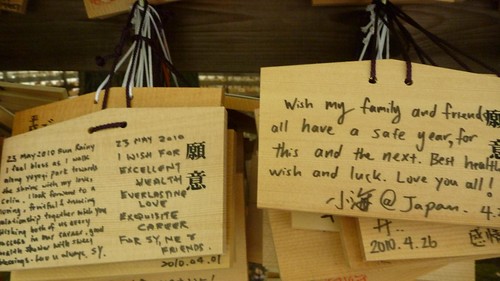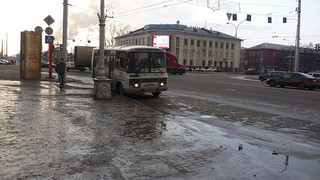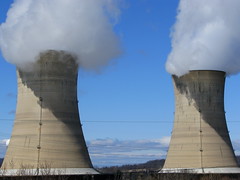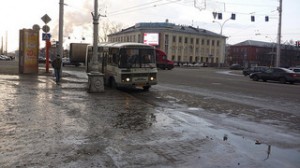One of the most interesting and innovative global projects based in Tokyo is Safecast and who better to explain it than one of the most interesting and innovative people I know: Sean Bonner! I visited him at Safecast HQ in Tokyo and he explained not only what the project is, but also how it impacted his life as a new resident of Japan.
Tag Archives: nuclear
Getting Off Nuclear Fast
 I had to read the sentence a few times out loud to friends in order to understand if I was getting it wrong: “all but two of Japan’s 54 nuclear reactors have been shut down since the Fukushima disaster last year.”
I had to read the sentence a few times out loud to friends in order to understand if I was getting it wrong: “all but two of Japan’s 54 nuclear reactors have been shut down since the Fukushima disaster last year.”
How could that be? A nation that was so, seemingly, dependent on nuclear energy, within a year after a major disaster, goes almost completely off of nuclear energy. In my mind this would leave Japan completely in the dark and in a terrible situation when it comes to availability of power. That’s not because I like or want nuclear energy, it is purely from the thinking that Japan was so dependent on that type of energy.
As it turns out, Japan was not quite dependent on nuclear. Officially 1/3 of their energy came from their 54 reactors. So the country would be operating on only 2/3 of its normal power capacity. Of course it is also winter, so the air conditioners haven’t kicked in yet, which could amount to a massive amount of increased power demands. Meanwhile it has been reported that the government has been pushing for big power conservation activities in both business and residential buildings. Add to that whatever quick power generating solutions the country could setup within a year, and you’ve got the current situation for Japan. But will this hold?
To get a better idea of what is going on, I turned -not to the media- but to a concerned citizen on the ground in Tokyo, to find out what information is available there and what they’re experiencing on a day to day basis. Frequent guest of the podcast and my good friend Karamoon replied to my questions as follows:
Very few people in Japan are aware that almost all the nuclear
reactors are still offline. The situation is not mentioned in the
Japanese media.No black outs here at the moment. Things *may* be different in the
summer when people start using air conditioning and the load on the
power grid could therefore be much greater.I guess there are 3 reasons that we have enough power here. The main
reason is that the non-nuclear power plants usually operate at much
less than 100% of their maximum capacity. When the nuclear power
plants were taken offline, the non-nuclear plants started to run at
full capacity, making up for the shortfall. The cost of running a
nuclear plant is the same regardless of the output level, so they are
always run at close to 100% capacity. Non-nuclear plants are more
efficient when running at lower capacities, and are used to provide
flexibility when the load on the power grid changes with the seasons,
for example.A second reason is that companies are making their own power, and may
even be able to sell surplus power in the near future. A third reason
is that companies have been taking measures to use less energy.It is important to remember that nuclear power is essentially a myth.
Also, nuclear power plants require vast amounts of oil during their
life cycle and, therefore are clearly not carbon-neutral. (whatever
that really means)
Once again it is only one wise citizen’s observation, but he touches on several important issues that clearly aren’t making it into the media in Japan and nations that have nuclear energy are often afraid to discuss: the real cost of nuclear energy, what we could really do if serious conservation efforts were made. We’re so often told nuclear energy is necessary because our lifestyle demands so much energy, but then in one short year one of the most modern nations in the world shows that if people really have to, they can change their lifestyle and still live well.
ctrp333 Walking into Seversk
 My good friend Ilya calls it “A piece of the Soviet Union on the territory of Modern Russia”: its what people say about the town of Seversk, Russia. Once home to 3 nuclear reactors and kept secret during the days of the USSR, the people of this community have voted to stay closed and stay behind walls for the foreseeable future.
My good friend Ilya calls it “A piece of the Soviet Union on the territory of Modern Russia”: its what people say about the town of Seversk, Russia. Once home to 3 nuclear reactors and kept secret during the days of the USSR, the people of this community have voted to stay closed and stay behind walls for the foreseeable future.
What is life like within the walls? Who lives in Seversk? Ilya and I take the short ride from Tomsk to Seversk while discussing how this town works. We also walk up to the gates, describing the landscape. Which apparently is not allowed but ignorance is bliss in this case.
ctrp327 Obama’s Nuclear Push

During his presidency GW Bush spoke openly about a return to building nuclear powerplants in the US. Now, president Obama says he’s going forward with those plans, calling Nuclear Power a clean solution for America. However despite the pro-nuclear policies of both presidents, projects are costing double and triple their original budget, designs and plans are full of problems and delays, and the question of how to handle extremely dangerous nuclear waste still has no answer.
My guest on this program is Kate Sheppard, a journalist who rights about politics and the environment for Mother Jones Magazine in Washington, DC. She joins me to talk about whats happening with the Obama administration’s nuclear plans and who is benefiting from all this. Her article “Obama’s Nuclear Giveaway” is available now on motherjones.com. You can also follow her on twitter.
Nuclear Juntas
Can’t quite finish the vlog I’m working on tonight so instead I wanted to bring up Burma. Or Myanmar, same difference.
What strikes me as odd and worthy of attention about Burma is that over the past 6 years they’ve managed to come in completely below the diplomatic and global media radar. Besides the international sanctions applied years ago, rarely does any politician in any country make a concerned speech about a country ruled by a bunch of military thugs. They periodically arrest political dissidents and are conducting their own insane slave labor project of building a new capital, mostly funded with the help of Dick Cheney associates of the oil industry. I guess that detail helps to explain some of the silence from the diplomatic side.
Today I read about Russia’s deal to supply them with a nuclear reactor. Naturally the Russian government, having long shown it doesn’t care much for human rights, see’s no problem in doing such big business with a cabal that the world likes to not think about. And irritatingly enough, compared to all the noise about Iran, or the scary stories spread about North Korea, one would have to work very hard to find criticism of this deal from any powerful government out there.
For the time being, I’ll look to the Burma correspondents of global voices online, who normally provide a good snapshot of happenings in the isolated country.
Tomorrow I’m coming out of academic retirement and participating in blogwalk Amsterdam. I think I’ll take the boat, hopefully parking won’t be bad.
bm174 Westinghouse and Nuclear Media
Loads of internet connection problems out here on the street. This podcast focuses on the Westinghouse Corporation.. who have played and continue to play, a huge role in US media and nuclear energy world wide. After their recent deal with China, I decided to take a closer look at their record and talk about the dangers of the deals.
Read the article.
Westinghouse on Wikipedia
Multinational Monitor, old article
No time for many links.. battery running out.
oh one last night.. its now my THIRD YEAR as a podcaster… not sure when this month.. but my 2nd anniversary just passed. Id like to thank my producer and my family and gawd…. oh wait no.. I just wanted to thank all of you.. bla bla bla shmaniversary.. thanks for listening!

